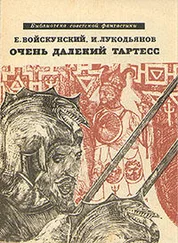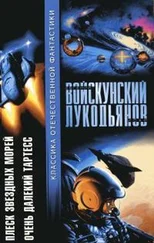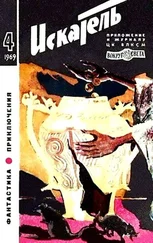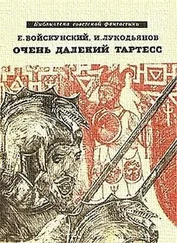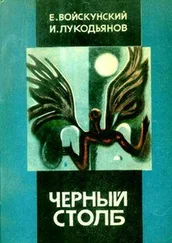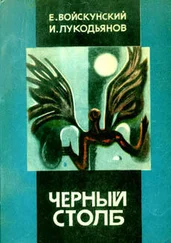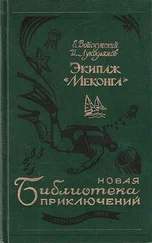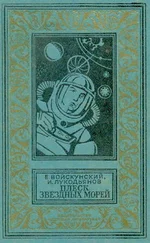Исай Лукодьянов - The Black Pillar
Здесь есть возможность читать онлайн «Исай Лукодьянов - The Black Pillar» весь текст электронной книги совершенно бесплатно (целиком полную версию без сокращений). В некоторых случаях можно слушать аудио, скачать через торрент в формате fb2 и присутствует краткое содержание. Город: Moscow, Год выпуска: 1968, Издательство: MIR Publishers, Жанр: Фантастика и фэнтези, на английском языке. Описание произведения, (предисловие) а так же отзывы посетителей доступны на портале библиотеки ЛибКат.
- Название:The Black Pillar
- Автор:
- Издательство:MIR Publishers
- Жанр:
- Год:1968
- Город:Moscow
- ISBN:нет данных
- Рейтинг книги:3 / 5. Голосов: 1
-
Избранное:Добавить в избранное
- Отзывы:
-
Ваша оценка:
- 60
- 1
- 2
- 3
- 4
- 5
The Black Pillar: краткое содержание, описание и аннотация
Предлагаем к чтению аннотацию, описание, краткое содержание или предисловие (зависит от того, что написал сам автор книги «The Black Pillar»). Если вы не нашли необходимую информацию о книге — напишите в комментариях, мы постараемся отыскать её.
© god54
The Black Pillar — читать онлайн бесплатно полную книгу (весь текст) целиком
Ниже представлен текст книги, разбитый по страницам. Система сохранения места последней прочитанной страницы, позволяет с удобством читать онлайн бесплатно книгу «The Black Pillar», без необходимости каждый раз заново искать на чём Вы остановились. Поставьте закладку, и сможете в любой момент перейти на страницу, на которой закончили чтение.
Интервал:
Закладка:
But all in all there was now no immediate danger.
Will made plasticine figures, and when he tired of modelling, he would ask Norma to read the papers or his favourite "Peregrine Pickle" to him. He would listen with closed eyes, breathing evenly, and when Norma looked at him, she could not always make out whether he was really listening, or engrossed in his own thoughts, or just fast asleep.
"As soon as you're better," she said one day, "I'm going to take you back with me to England."
Will was silent.
"What do you say to settling in Cheshire, somewhere near the moors?" she asked another time.
He had to answer something, so he said, "I prefer Cumberland."
"Very well," she agreed at once. Then suddenly her face lit up: "Cumberland. Why, of course, we spent our honeymoon there. Heavens, it's nearly twenty-five years ago. I'm so glad, dear, that you remembered."
"You're quite mistaken to think I remembered our honeymoon. It's simply that there are cliffs and sea there," he said, calmly. "Better read me that idiotic story about the tortoises."
So Norma began to read the "Lords of the Underworld", which was being serialized in the "Daily Telegraph"-an interminable sensational novel about hordes of fiery tortoises that had emerged from the depths of the Earth and were roaming over the planet, burning and destroying every living creature until their leader fell in love with Maud, the beautiful wife of an oil-dealer.
The passion of the fire-breathing leader had just reached its peak when there was a knock at the door, and Ali-Ovsad, Kravtsov, and Olovyannikov came into the cabin.
"I think you're right, Will," said Kravtsov, seating himself by the Scotsman's bedside. "The pillar's got to be cut off with an atom bomb."
"Yes," answered Will. "A guided atom bomb. That's what I thought before."
"And now?"
"Now I think we'll cut the pillar with an atomic explosion and the magnetic field will become normal again. But the pillar will still go on rising and will reach the ionosphere once more. So there'll be another short circuit."
"That's true," said Kravtsov. "So how are we to stop it, damn it all?"
"It will probably stop by itself," said Ali-Ovsad. "Plastic pressure will squeeze all the rock out and stop."
"I don't think we should reckon on that, Ali-Ovsad."
"The day before yesterday," said Olovyannikov, "the journalists got Stamm into a corner and demanded news. Of course, we couldn't get anything out of him-he's made of reinforced concrete-but he did start telling us all about his pet theory. Have you ever heard of the theory of the expanding Earth, Sasha?"
"I've heard something about it: we used to argue about it when I was a student."
"Stamm was telling us some very curious things. He said that during the Palaeozoic period the diameter of the Earth was round about a third of what it is now. Was he talking seriously, do you think, or was Uncle Stamm joking?"
Kravtsov smiled. "Don't talk nonsense, Lev. Stamm would rather… well, I don't know… he'd rather bite you than joke. Such a hypothesis does exist-it is one of many. They say that the centre of the Earth is the remains of a very solid stellar substance out of which the Earth was formed sometime. The centre, they say, is constantly undergoing a process of de-solidification; its particles are gradually penetrating into the upper strata and… well, expanding them. But all that, of course, is a frightfully slow process."
"Well, this is what Stamm said-that new heavy particles-protons and neutrons, I believe-are continually coming into being in the interior of the Earth and are increasing the mass of the Earth. But where do the new particles come from?"
"That's the big question," said Kravtsov. "I don't really remember it now, but we had violent arguments then about this hypothesis; at one time one of our lecturers was a pupil of its author, Kirillov… Where do the new particles come from? I remember talk about the mutual transition of fields and substances, that is, of qualitatively different forms of matter: this transition creates an impression of… the birth, as it were, of a new substance. In short, it's the combined action of gravitational, electromagnetic, and some other fields, as yet unknown. What's the good of talking? Only a single theory of fields would open our eyes."
"Are you perchance suggesting, Mr. Kravtsov," the Scotsman's mocking voice was heard to say, "that our darling pillar consists of pro-tonic or neutronic matter?"
"No, Mr. McPherson. I'm merely recapitulating the hypothesis our darling Stamm proclaims."
"And what do you proclaim?"
"Boiled buckwheat, Will, as you know very well." Kravtsov took a tiny plasticine aircraft from the table and turned it over in his hands. "I see you're turning to new subjects in your art."
"Give it here." McPherson took the model from him and crumpled it up.
"After all, it's a good thing, Will, that you became a drilling engineer and not a sculptor," remarked Kravtsov.
"You always know what's good and what's bad. An omniscient young man."
"Well, I never thought you'd be offended," said Kravtsov, with surprise.
"Rot," said the Scotsman. "I'm not offended, laddie. But I don't like it when you start rowing with the Americans."
"I didn't start it, Will. I'm not all that pugnacious."
There was silence for a while. The flame of the lamp flickered, and shadows flitted about the cabin.
"I want to sleep a lot now," said Ali-Ovsad suddenly. "Before I slept very little. Now I want a lot. Probably because the magnetic field is all wrong."
"Everything can be blamed on the magnetic field now," said Kravtsov, smiling. "Or on the gravitational field."
"Gravitation," continued Ali-Ovsad. "Everyone says 'gravitation'. I didn't know that word before, now I dream of gravitation. What is it?"
"But I explained it to you, Ali-Ovsad."
"Ai balam, you explained badly. You tell me straight! Is it weight or force? I drilled the earth a lot. I know the earth has great force inside."
"Who's arguing?" said Kravtsov.
"No wonder it's respectfully called 'Mother Damp Earth' in all the Russian fairy tales," observed Olovyannikov. "Sasha, do you remember the ballad of Mikula Selyaninovich?"
"A ballad? Tell it, please, would you?" asked Will.
"How he loves stories," thought Kravtsov. "That's all he wants."
"Well," began Olovyannikov with relish. "Once upon a time there was a ploughman named Mikula Selyaninovich. One day he was ploughing near the road and he had put his bag of victuals on the ground. He ploughed and ploughed and kept watching the sun, because he wanted to get done early. While he ploughed the great champion Volga passed by on his powerful steed. He felt bored with riding and was complaining aloud to himself: 'There's nowhere for me to use my champion's strength. Everything's too weak and too easy.' Mikula Selyaninovich heard the champion boasting and said to him: 'Try to lift my bag.' His bag! Hursh! What a challenge! Volga bent down without getting off his horse and took hold of the bag with one hand. It wouldn't budge. He had to dismount and take it in both hands. And he still couldn't lift it. Volga the champion got angry and pulled at the bag with all his might, but he didn't lift it. Instead he himself sank knee-deep into the earth. And Mikula Selyaninovich explained to him: 'They say there's pull in the bag from the damp earth.' "
"Your's a good story," said the Scotsman, approvingly.
"A story with a clear social implication," explained Kravtsov. "Mikula personifies peaceful toil, while the Volga the champion…"
"Maybe so. Or maybe it's simply that your wise forefathers felt the irresistibility of gravity. That's where the fantastic propositions of our times originate… Mikula-what did you call him?"
Читать дальшеИнтервал:
Закладка:
Похожие книги на «The Black Pillar»
Представляем Вашему вниманию похожие книги на «The Black Pillar» списком для выбора. Мы отобрали схожую по названию и смыслу литературу в надежде предоставить читателям больше вариантов отыскать новые, интересные, ещё непрочитанные произведения.
Обсуждение, отзывы о книге «The Black Pillar» и просто собственные мнения читателей. Оставьте ваши комментарии, напишите, что Вы думаете о произведении, его смысле или главных героях. Укажите что конкретно понравилось, а что нет, и почему Вы так считаете.

